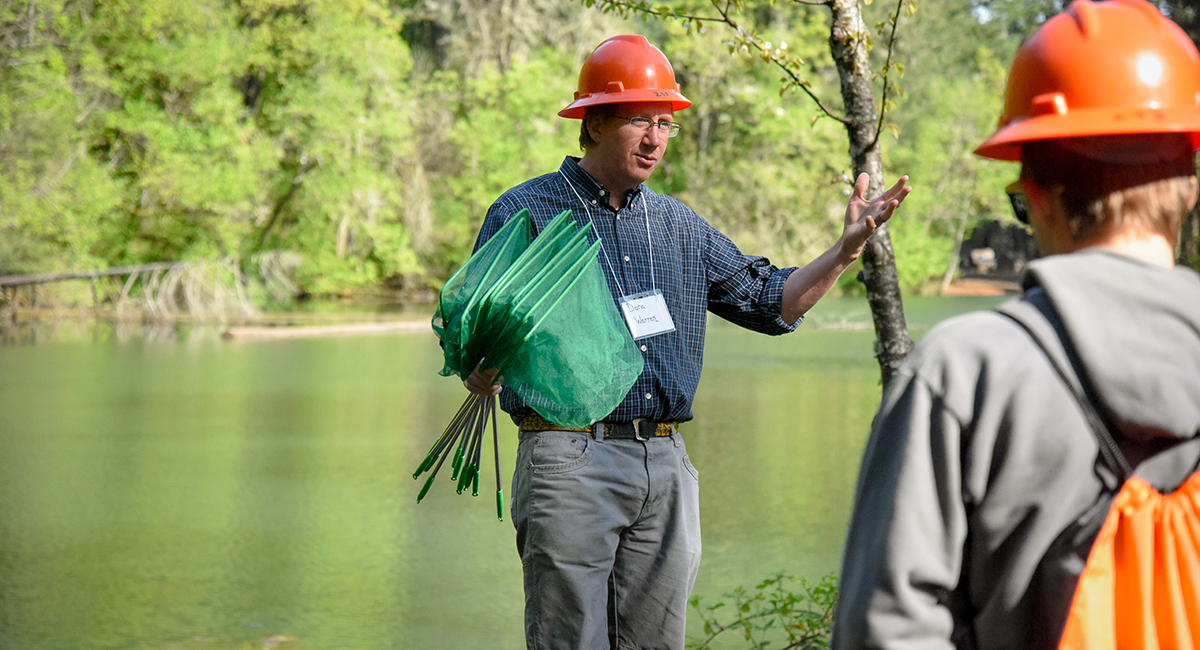The Forest Ecosystems and Society (FES) graduate program develops interdisciplinary thinkers, highly capable scientists, and natural resource leaders who are prepared to solve complex problems wherever they exist on the socioecological spectrum. Students earn their Master of Forestry (MF), Master of Science (MS), or Doctor of Philosophy (PhD) degrees as they build the skills and knowledge they will need for fascinating careers in research, teaching, management, policy, outreach, and more.
Internationally recognized faculty and facilities
Our faculty are world leaders in a wide variety of disciplines, including:
- Restoration ecology
- Forest ecology
- Social science / human dimensions of natural resources
- Genetics and tree improvement
- Tree physiology
- Climate change and carbon dynamics
- Natural resource economics and policy
- Wilderness and recreation resource management
- Silviculture
- Wildlife biology
- Nature-based tourism and ecotourism
- Urban Forestry
Students will also benefit from FES’ collaborative ties with the US Forest Service, the USGS Forest and Range Ecosystem Science Center, and the US Environmental Protection Agency.
As part of our world-class facilities, FES has access to ‘living laboratories’ spread over more than 27,000 acres around Oregon. Students can conduct research or take classes in the College Forests, the HJ Andrews Experimental Forest, and a wide array of public and private forested landscapes, as well as local, state, and national parks.
The flexibility to build your perfect program
In the FES program, graduate students are not limited by a heavily mandated curriculum or a required study track. There are only three required courses in the FES graduate program where all students must enroll in FES 520 “Posing Researchable Questions” (3 credits) usually in the fall term of their first year and FES 525 “Interdisciplinary Collaborative Problem Solving” (3 credits) usually in the fall term of their second year. Additionally, all students must enroll in FES 526 “Effective Communication and Presentation Skills for Scientists” (1 credit) usually offered in spring term.
Other than the three required courses listed above, FES graduate students work with hand-picked faculty and professionals to create their own list of other courses and the topic of their capstone (MF), thesis (MS), or dissertation (PhD) project. This flexibility allows students to focus on the skills and knowledge most relevant to their interests. FES students can graduate with a truly interdisciplinary education, with coursework from programs, departments, and colleges all across Oregon State University.
Devotion to diversity, in whatever form it takes
Today’s socioecological problems have international impact, affecting communities and individuals regardless of age, income, race, creed, ethnicity, gender, or personal history. We endeavor to educate students of all possible backgrounds, preparing them to contribute their perspective as professionals in their field of study. The diversity of our student body extends to their interests as well, with students identifying as biologists, sociologists / human dimensions specialists, geneticists, philosophers, ecologists, economists, natural resource practitioners, and any number of combinations in and around these fields.
3+2 Forestry Joint Degree Program
Willamette University and Oregon State University have partnered to offer a 3+2 joint degree program that combines the breadth of the Willamette University undergraduate curriculum with highly focused graduate study in Oregon State University’s College of Forestry. Students will learn from expert faculty and have the opportunity to study in both the Willamette Zena and OSU Research Forests (i.e., “College Forest”) while earning both bachelor’s and master’s (MF) degrees.
After completing three years of undergraduate coursework at Willamette University and maintaining a minimum GPA of 3.0, Willamette University students will choose to complete a Master of Forestry (MF) program in Forest Ecosystems and Society or Sustainable Forest Management at Oregon State University. Students must declare their intention to pursue this pathway by the start of the third year at Willamette University and formally apply to OSU according to Graduate Admissions application deadlines. If admitted to Oregon State University, students will enroll with provisional graduate status in year four. Please see the sample timeline to map out a MF degree at OSU.
If you are a Willamette University undergraduate student in your first or second year and have interest in this 3+2 joint degree pathway, please connect with your advisor at Willamette University and contact the appropriate Graduate Program Coordinator at Oregon State University: Juliet Sutton (Forest Ecosystems and Society Graduate Program Coordinator) or Madison Dudley (Sustainable Forest Management Coordinator).
Want to know more?
Examples of jobs that our graduate students have been hired for after graduation and employers who have hired our graduates can be found here: PDF.
Interested? Have questions? Please contact our Graduate Program Coordinator (see below) to learn more about the Forest Ecosystems and Society graduate program.
Juliet Sutton
FES Graduate Program Coordinator
juliet.sutton@oregonstate.edu
541-737- 6088
